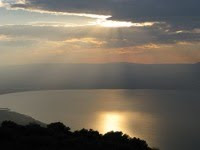John 4 contains some extraordinary details!
From time to time people realised who Yahshua truly is. He's not just a wise teacher, a generous judge, or a great prophet (though he is all of those things).
 But he is the Messiah, the Son of the Most High, the Promised One sent from Heaven by the Almighty himself! He is an awesome person, the One the ages have been waiting for, the very turning point of history.
But he is the Messiah, the Son of the Most High, the Promised One sent from Heaven by the Almighty himself! He is an awesome person, the One the ages have been waiting for, the very turning point of history.But in Galilee or Judaea, almost every time someone realised the truth Yahshua told them to keep quiet about it, to tell no-one. And rarely, if ever, did he volunteer the information. But here, in Samaria of all places, to a woman, without the presence of the twelve, to a person living a sinful life - he actually spells it out. Doesn't that seem a little strange?
He spills his great and most precious secret to the lowest kind of person (in legalistic Jewish eyes). Even the disciples are puzzled, just think what the Scribes and Pharisees would have made of this!
Why did he do it?
Perhaps the simple truth is that Yahshua is not looking for holy people. He is not looking for achievement, but for obedience. And he knows what is in a person's heart.
Picture the scene. It was the sixth hour, in other words midday. The sun was at its highest and hottest, shade was hard to find, the road was dusty, they've been travelling since dawn and are tired, thirsty, and hungry. The twelve have gone to find something to eat and drink. Yahshua sits here in the dusty heat alone beside the well, Jacob's Well. Perhaps he's thinking about the passage in Genesis where his ancestor Jacob is at a similar well in another foreign land at around midday. The sheep couldn't be watered until they were all gathered and the heavy covering stone was rolled away from the mouth of the well.
That he thought about this is speculation of course, but it's possible. Perhaps it's even quite likely.
Here he is in a foreign (and despised) land. The people who live here are also distant relatives sharing the same ancestors. Yahshua has come for the gathering of his own flocks, and like Jacob he has come to roll away the stone that blocks the mouth of the well so that the sheep can be watered. And here comes a woman to draw water much as Rachel must have done all those centuries before.
So he asks her for a drink, knowing already that this is a conversation the Father wants him to have. And in the conversation about living and eternal water, a heavy metaphorical stone is partly rolled away in the Samaritan woman's heart. He finally tells her who he is, the stone falls aside, her understanding becomes clear, and she leaves her jar to run back to town to tell everyone. She tells them all, they spend some time with the Master, and many of them believe.
Nothing in the Bible is there by mistake. This despised, foreign, sinful woman has a place in John's Gospel for a reason. She is there to inspire us and encourage us. Yahshua's gift of life and his promise of an endless supply of living water is for all people of any status in any land. It's for those leading sinful lives. It's for those who are despised. It is for you and for me - HalleluYah!
< John 3 | Index | John 5 >






